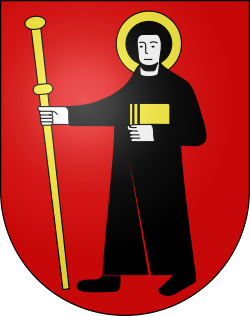Fridolin
| Saint Fridolin of Säckingen | |
|---|---|

The coat-of-arms of Glarus, which depicts Fridolin.
|
|
| Apostle of the Upper Rhine | |
| Died | c.540 Säckingen, Germany |
| Venerated in | Eastern Orthodox Church |
| Canonized | Pre-Congregation |
| Feast | March 6 |
| Patronage |
Alsace, France for good weather Glarus (city and canton), Switzerland Säckingen, Germany Strasbourg, France |
Saint Fridolin, otherwise Fridolin of Säckingen, traditionally believed to have been born in Ireland, was a missionary, and the founder of Säckingen Abbey, Baden, in the 6th or 7th century. He is honoured as the apostle of the Alamanns.
There is very little definite information on Fridolin. He is traditionally venerated as an Irish missionary and the first to work among the Alamanns on the Upper Rhine, in the time of the Merovingians. The only portion of the late Life that can be regarded as historically sound is that he founded a monastery on the island of Säckingen in the Rhine. There is no exact information on the date of the foundation. The monastery, however, was of great importance by the 9th century: the earliest extant document concerning it records the gift, on 10 February 878, of the monastery by Charles the Fat to his wife Richardis.
The biography written by Balther, a monk of Säckingen, at the beginning of the 11th century, is the earliest documentary reference to Fridolin (or Fridold), According to this, he belonged to a noble family in Ireland, and at first was a missionary there. Afterwards crossing to France, he came to Poitiers, where in answer to a vision, he sought out the relics of Saint Hilarius, and built a church for them. Saint Hilarius subsequently appeared to him in a dream, and commanded him to proceed to an island in the Rhine, in the territories of the Alamanns. In obedience to this summons, Fridolin approached the "Emperor" Clovis, who granted him possession of the still unknown island, and thence proceeded through "Helion",Strasbourg and Coire, founding churches in every district in honour of Saint Hilarius.
He also, according to the "Vita", spent considerable time in the territory that is now Switzerland, where he converted the landowner Urso. On his death Urso left his enormous lands, now the Canton of Glarus, to Fridolin, who founded numerous churches dedicated to Saint Hilarius (the origin of the name "Glarus"). Urso's brother Landolf refused to accept the legitimacy of the gift and brought Fridolin before a court at Rankweil to prove his title. Fridolin did so by summoning Urso from the dead to confirm the gift in person, so terrifying Landolf that he gave his lands to Fridolin as well. Fridolin is thus often represented with a decomposing corpse, in reference to this story.
...
Wikipedia
